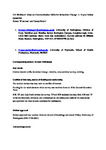UK Dietitians’ views on Communication Skills for Behaviour Change: A 10 year follow up survey
| dc.contributor.author | Whitehead, K | |
| dc.contributor.author | Parkin, Tracey | |
| dc.date.accessioned | 2021-04-14T08:24:43Z | |
| dc.date.available | 2021-04-14T08:24:43Z | |
| dc.date.issued | 2021-04-07 | |
| dc.identifier.issn | 0952-3871 | |
| dc.identifier.issn | 1365-277X | |
| dc.identifier.other | jhn.12903 | |
| dc.identifier.uri | http://hdl.handle.net/10026.1/17042 | |
| dc.description.abstract |
<jats:title>Abstract</jats:title><jats:sec><jats:title>Background</jats:title><jats:p>In 2007, a survey of UK dietitians identified that dietitians were positive about the use of Communication Skills for Behaviour Change (CSBC) in practice, although barriers to the implementation of skills were acknowledged. This follow‐up survey aimed to explore current perceptions of CSBC and compare them with the previous survey.</jats:p></jats:sec><jats:sec><jats:title>Methods</jats:title><jats:p>A cross‐sectional online survey of British Dietetic Association (BDA) members’ views of CSBC was undertaken. The results for full members are presented. Quantitative data were analysed descriptively. Qualitative data were subject to either content, or inductive thematic analysis.</jats:p></jats:sec><jats:sec><jats:title>Results</jats:title><jats:p>A response rate of 9.4% (<jats:italic>n</jats:italic> = 729) was achieved. Respondents were predominately female (<jats:italic>n</jats:italic> = 684; 95.1%) and worked in the National Health Service (<jats:italic>n</jats:italic> = 634; 87.4%). They were positive about the importance of CSBC in practice (<jats:italic>n</jats:italic> = 714; 99.5%). Pre‐registration training had been completed by 346 respondents (48.7%).</jats:p><jats:p>Post‐registration training had been undertaken by 520 (74.7%) respondents and 514 of these (99.6%) had implemented training into practice, with few barriers identified. Perception of ability to use skills had increased, with 513 (83.6%) respondents rating their skills as excellent/very good compared to 62% previously. The majority (<jats:italic>n</jats:italic> = 594; 93.7%) reported that post‐registration training was necessary, with the need for skills to be regularly reviewed (<jats:italic>n</jats:italic> = 456; 74.5%), and 235 (51.9%) respondents suggested this be mandatory. By contrast, some suggested that a skill review was not a priority, and would be difficult to administer and stressful.</jats:p></jats:sec><jats:sec><jats:title>Conclusions</jats:title><jats:p>Perception of the importance of CSBC remains high. Although the perceived ability to apply CSBC has increased, the perceived need for post‐registration training is high, with respondents’ favouring mandatory training.</jats:p></jats:sec> | |
| dc.format.extent | 112-123 | |
| dc.format.medium | Print-Electronic | |
| dc.language | en | |
| dc.language.iso | en | |
| dc.publisher | Wiley | |
| dc.subject | behaviour change | |
| dc.subject | communication skills | |
| dc.subject | cross‐ | |
| dc.subject | sectional survey | |
| dc.subject | dietetics | |
| dc.subject | training | |
| dc.title | UK Dietitians’ views on Communication Skills for Behaviour Change: A 10 year follow up survey | |
| dc.type | journal-article | |
| dc.type | Journal Article | |
| dc.type | Research Support, Non-U.S. Gov't | |
| plymouth.author-url | https://www.webofscience.com/api/gateway?GWVersion=2&SrcApp=PARTNER_APP&SrcAuth=LinksAMR&KeyUT=WOS:000649415300001&DestLinkType=FullRecord&DestApp=ALL_WOS&UsrCustomerID=11bb513d99f797142bcfeffcc58ea008 | |
| plymouth.issue | 1 | |
| plymouth.volume | 35 | |
| plymouth.publication-status | Published | |
| plymouth.journal | Journal of Human Nutrition and Dietetics | |
| dc.identifier.doi | 10.1111/jhn.12903 | |
| plymouth.organisational-group | /Plymouth | |
| plymouth.organisational-group | /Plymouth/Faculty of Health | |
| plymouth.organisational-group | /Plymouth/Faculty of Health/School of Health Professions | |
| plymouth.organisational-group | /Plymouth/REF 2021 Researchers by UoA | |
| plymouth.organisational-group | /Plymouth/REF 2021 Researchers by UoA/UoA03 Allied Health Professions, Dentistry, Nursing and Pharmacy | |
| plymouth.organisational-group | /Plymouth/Research Groups | |
| plymouth.organisational-group | /Plymouth/Research Groups/Institute of Health and Community | |
| plymouth.organisational-group | /Plymouth/Users by role | |
| plymouth.organisational-group | /Plymouth/Users by role/Academics | |
| dc.publisher.place | England | |
| dcterms.dateAccepted | 2021-03-29 | |
| dc.rights.embargodate | 2022-4-7 | |
| dc.identifier.eissn | 1365-277X | |
| dc.rights.embargoperiod | Not known | |
| rioxxterms.versionofrecord | 10.1111/jhn.12903 | |
| rioxxterms.licenseref.uri | http://www.rioxx.net/licenses/all-rights-reserved | |
| rioxxterms.licenseref.startdate | 2021-04-07 | |
| rioxxterms.type | Journal Article/Review |


